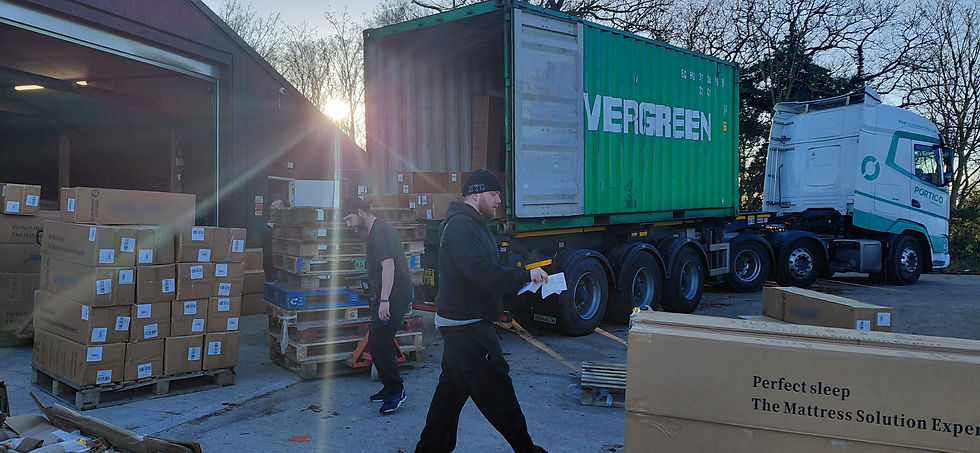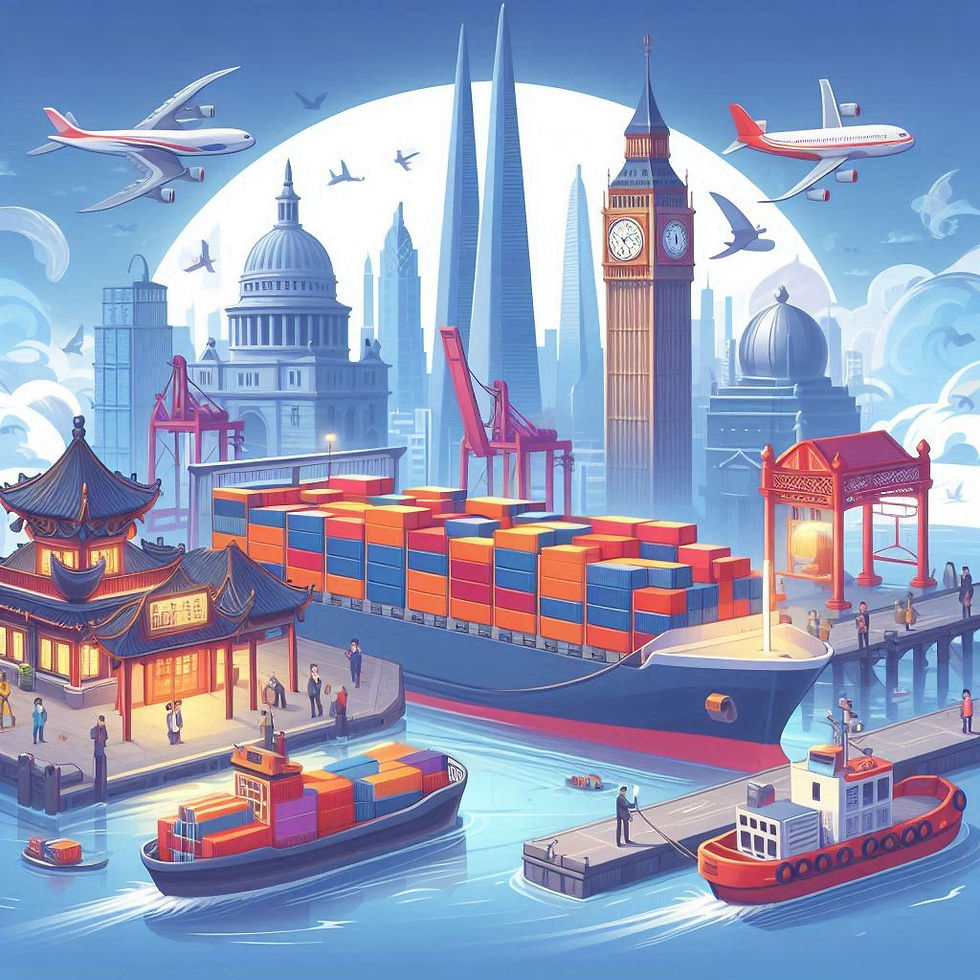What Is Devanning? Definition and Guide for Ecommerce Success
- Blue30

- Nov 10, 2025
- 7 min read
Updated: Jan 1
In the fast paced world of ecommerce, every detail in your supply chain matters. From how goods are received at ports to how they’re stored and shipped, each stage can make or break efficiency. One often overlooked but essential part of this process is devanning.
At first glance, devanning might sound like a small technical step in logistics, simply unloading goods from a container. But, in reality, it’s far more significant. Done correctly, devanning can speed up warehouse operations, reduce damage, and keep inventory moving seamlessly. Done poorly, it can create bottlenecks that disrupt your entire supply chain.

At Blue30, we specialise in professional devanning services across key UK ports, including London Gateway, Felixstowe, and Tilbury. In this guide, we’ll explain what devanning is, why it’s so important in ecommerce, and how Blue30 ensures it’s done efficiently and safely.
What is Devanning?
Devanning is the process of unloading cargo from a sealed shipping container once it has arrived at its destination. It’s also commonly referred to as unpacking, unstuffing, or stripping.
In simple terms, devanning is when trained warehouse professionals open a container and remove its contents, typically using forklifts, pallet jacks, or cranes, so the goods can be received, inspected, and prepared for storage or delivery.
This process usually happens once the container has reached a destination warehouse or fulfilment centre after drayage (short distance transport from the port). It’s the first physical step in getting products from international suppliers into the hands of UK retailers or ecommerce sellers.
For example, if an ecommerce retailer imports 1,000 units of stock from an overseas supplier, those goods will arrive sealed inside a shipping container. Once that container reaches a Blue30 facility at the London Gateway or Felixstowe Port, our devanning team will unload and inspect the shipment, ensuring everything is accounted for and ready for the next stage in the logistics process.
Why Devanning Matters in Ecommerce
Many businesses underestimate just how crucial devanning is. When handled efficiently, it supports the entire supply chain, but if mistakes occur, they can be costly.
Here’s why devanning deserves your attention:
1. Prevents Damage and Loss
Rushed or unstructured unloading increases the risk of damaged goods. Professional devanning ensures each pallet or carton is handled safely, protecting your investment.
2. Speeds Up Warehouse Operations
The way goods are unloaded determines how quickly they can move through receiving, storage, and order fulfilment. A well organised devanning process means products hit the shelves (or go live online) faster.
3. Reduces Supply Chain Delays
Inconsistent devanning leads to backlogs at warehouses and ports. Efficient processes ensure smooth cargo flow and prevent costly demurrage fees, especially important during peak seasons.
4. Improves Stock Accuracy
Proper unloading and labelling ensure every SKU is recorded correctly, reducing errors in stock counts and warehouse management systems.
5. Supports Safety and Compliance
UK ports and logistics operations are governed by strict safety regulations. Trained devanning professionals follow these standards to maintain safe working conditions and compliance.
At Blue30, we recognise that devanning isn’t just a step in the process, it’s a foundation for everything that follows. Our teams are trained to handle complex loads, from fragile goods to oversized cargo, ensuring maximum safety and efficiency.
How the Devanning Process Works
The devanning process varies slightly depending on the cargo type, container size, and storage requirements. However, most devanning operations follow a structured flow.

Step 1: Container Arrival
After the container arrives at the destination port or warehouse (such as Blue30’s facility at Tilbury or London Gateway), it’s positioned securely on either a dock level or ground level bay, depending on accessibility.
Step 2: Safety Inspection
Before the seal is broken, the devanning crew conducts a full safety inspection. They check for potential hazards, uneven flooring, unsecured cargo, or leaks, and ensure the area is well lit and clear.
Step 3: Unsealing and Unloading
Once cleared, the team carefully unseals the container and begins unloading. Forklifts or pallet trucks are used to remove goods systematically. For floor loaded containers, items may be unloaded manually, a process known as handballing.
Step 4: Sorting and Palletising
Goods are then sorted and palletised according to SKU, order, or client specifications. This step ensures everything is properly identified and ready for put away or onward distribution.
Step 5: Inspection and Reporting
Each pallet is inspected for damage, verified against shipping documents, and logged into the warehouse management system. Any discrepancies or issues are recorded immediately for transparency.
Step 6: Storage or Transfer
Once verified, goods are either moved into storage, cross docked for immediate distribution, or delivered directly to fulfilment centres or retail outlets.
At Blue30, we use state of the art equipment and experienced crews to ensure every stage is completed to the highest standards, maintaining efficiency without compromising safety.
Common Devanning Challenges
Despite being a well established process, devanning isn’t without its challenges. Understanding these helps businesses plan better and choose logistics partners equipped to handle them effectively.
1. Port Congestion
Unexpected delays at UK ports, often due to global disruptions or peak season backlogs, can cause containers to pile up. This creates bottlenecks that delay unloading and storage.
2. Staffing Shortages
Devanning requires skilled professionals trained in operating heavy machinery. Labour shortages, particularly during busy periods, can slow operations and increase costs.
3. Stock Identification Errors
Inconsistent labelling from overseas suppliers can cause confusion when receiving stock. Without clear identification, goods can be misplaced or miscategorised.
4. Container Prioritisation
Miscommunication about which containers should be unloaded first can lead to operational inefficiencies, especially when dealing with time sensitive goods.
5. Safety Hazards
Manual handling, heavy equipment, and confined spaces all pose risks. Without strict safety measures, accidents can occur, endangering workers and inventory.
At Blue30, we proactively address these challenges by implementing robust safety protocols, maintaining experienced teams, and leveraging smart warehouse technology to enhance visibility and control.
Devanning Best Practices for UK Businesses
Whether you handle devanning in house or through a partner like Blue30, following best practices ensures smoother, safer operations.

Prioritise Safety
Safety should always come first. Containers must be on level ground, with adequate lighting and clear access paths. All personnel should wear appropriate PPE and be trained in proper unloading techniques.
Maintain Clear Communication
Coordination between port authorities, carriers, and warehouse teams is key. Use digital tracking systems or warehouse management software to ensure everyone has real time visibility into container movements and priorities.
Use Automation and Technology
Modern devanning benefits from automation tools such as conveyor systems, scanning technology, and even robotic unloading arms. These tools improve accuracy and speed while reducing physical strain on workers.
Train and Certify Staff
Forklift and machinery operators should hold valid UK certifications. Regular refresher training helps maintain safety standards and operational efficiency.
Outsource When Necessary
If your business lacks the resources or space to handle devanning internally, outsourcing to a professional logistics partner like Blue30 is often the smarter choice. We provide full service devanning solutions, from unloading to inspection, reporting, and transfer, ensuring that your supply chain keeps moving efficiently.
Why Choose Blue30 for Devanning Services?
At Blue30, we understand the importance of getting devanning right. We’ve designed our services to meet the specific needs of UK ecommerce businesses, importers, and retailers.
Here’s what sets us apart:
Strategic Port Coverage: Our devanning services are available at London Gateway, Felixstowe, and Tilbury, three of the UK’s busiest and most important ports. This allows faster turnaround and reduced transportation costs.
Expert Teams: Every member of our devanning crew is trained and certified to handle various cargo types, from palletised goods to floor loaded containers.
Safety and Compliance: We adhere to all UK health and safety regulations, ensuring a secure working environment and minimising risk to goods and personnel.
Transparency and Reporting: Clients receive detailed unloading reports, including inventory checks, discrepancies, and damage assessments, ensuring full visibility across every stage.
End to End Solutions: Beyond devanning, Blue30 can manage onward storage, palletisation, labelling, and delivery, giving you a complete logistics solution in one place.
Scalability and Flexibility: Whether you handle weekly shipments or seasonal surges, our infrastructure and skilled workforce can scale to meet your needs.
By partnering with Blue30, you gain a logistics partner that understands the nuances of ecommerce fulfilment and can help you streamline your operations from port to customer.
The Role of Devanning in a Modern Supply Chain
In today’s ecommerce driven economy, speed and accuracy define success. Consumers expect faster delivery times and perfect order accuracy, leaving no room for inefficiencies in your backend operations.
Devanning might happen behind the scenes, but its impact is visible throughout your business. Efficient devanning ensures that:
Stock is available for sale sooner.
Warehouses operate more smoothly.
Order fulfilment stays consistent.
Customers receive their products faster.
As ecommerce continues to grow in the UK, businesses that optimise their devanning and warehousing processes will have a clear competitive edge.
Frequently Asked Questions About Devanning
1. How long does devanning take? Typically, between one and three days, depending on container size, type of goods, and whether it’s a full container load (FCL) or less than container load (LCL).
2. What equipment is used in devanning? Common tools include forklifts, pallet jacks, cranes, conveyors, and safety platforms. For manual unloading, teams use handballing methods to carefully break down loads.
3. What’s the difference between devanning and deconsolidation? Devanning is specifically about unloading goods from a container, while deconsolidation refers to breaking down larger shipments into smaller consignments for distribution.
4. Can Blue30 handle oversized or fragile goods? Absolutely. Our teams are trained to handle a wide range of cargo types, ensuring safe and efficient unloading no matter how delicate or complex the shipment.
5. Is outsourcing devanning cost effective? Yes. Outsourcing saves you the cost of equipment, training, and warehouse space, while ensuring the process is done by experienced professionals.
Conclusion: Streamline Your Supply Chain with Blue30
Devanning is much more than just unloading a container, it’s a critical part of your ecommerce supply chain that impacts everything from warehouse efficiency to customer satisfaction.
At Blue30, we bring experience, precision, and reliability to every devanning operation. Whether your containers arrive at London Gateway, Felixstowe, or Tilbury, our professional teams ensure your cargo is unloaded safely, efficiently, and ready for the next step.
If you want to enhance your logistics operations, minimise delays, and keep your supply chain running smoothly, get in touch with Blue30 today to learn more about our expert devanning services.
Ready to simplify your container unloading process? Contact Blue30 to book your next devanning service and discover how we can help optimise your UK logistics operations.





Comments